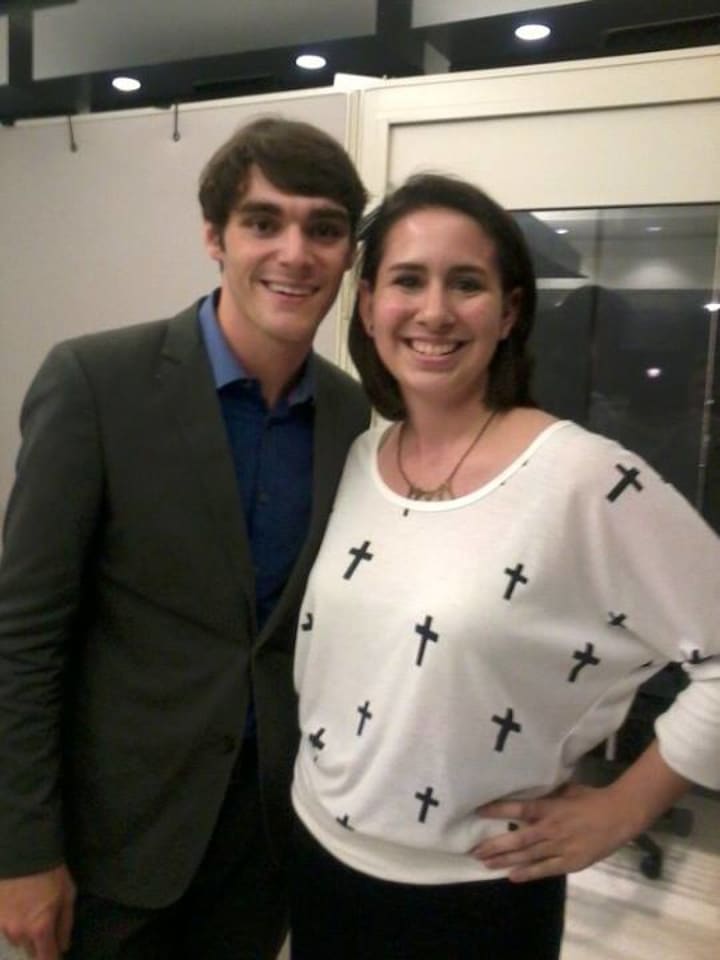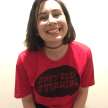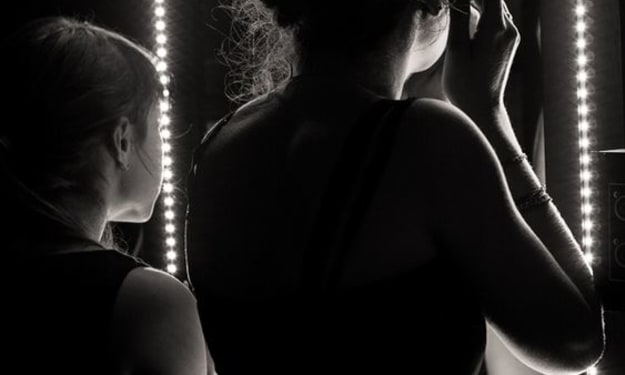My History with the A Word
My coming-of-age story as an autistic girl.

*Trigger Warning: Brief mention of suicide.
Nine or Ten
I was either nine or ten years old when I first heard the A word. The exact moment escapes me, but I know I was in the third grade. There was a boy (we’ll call him Ron) that I had met the previous school year, and it was clear right off the bat that he was different. He was obsessed with computers, he’d always point out when a light in the room was flickering, and he said “Good job! Yay!” whenever he completed a math problem. He was an odd kid, but everyone seemed to like him.
A year later, I learned his behavior was due to him being autistic. Yes, that’s the A word I’m referring to. Get your head out of the gutter.
I didn’t know the word “autism” until our second school year together, but I knew that Ron had special needs. He always had a teacher’s assistant by his side, he often spoke out during class, and we saw the same speech therapist practically every week, at the very least once. Granted, I later figured the fact that I saw a speech therapist possibly hinted that something was wrong with me, but it flew right over the head as a child. Glossing over the fact that I spent recess drawing pictures and playing in the dirt and did other unusual things, I was convinced that I was normal and Ron wasn’t.
At first, I didn’t think I could be autistic because I didn’t fit the stereotypical image that Ron did, but I still couldn’t question the possibility of me being on the spectrum. Ron and I had a few things in common; we both needed help in class, we normally spent our time alone from our peers, we had interests in things that no one else seemed to care about, and we often spoke out of turn. This all bothered me so much that I eventually asked my mom if I was autistic while we were driving home one day. I’m surprised that she didn’t slam on the breaks when she forcibly blurted “no” in response. There were no further questions after that because I took her word for it. After all, I could dress and feed myself, I got good grades, and I could normally think and speak for myself. An autistic child couldn’t do any of those things, right? It must’ve been foolish for me to even ask that question. Sure, I was a strange child, but I was normal, right?
Wrong. So dead wrong that I didn’t even get to leave behind plans for my funeral.
Thirteen
At the age of thirteen, I finally received some answers about whether or not something was wrong with me. My parents set me down in our living room, and they informed me that I had a disability called PDD-NOS (Pervasive Developmental Disorder-Not Otherwise Specified). Categorized by social and learning issues, I was informed that those with this disability often have difficulty communicating with others and usually needed assistance with assignments. They explained that this was why I had teacher’s assistants by my side in class and why I was often taken into another room to take tests. Surprisingly, I’d never questioned those two things, even though I thought it was odd that I had those options and others didn’t. It was also revealed that my parents knew about this since I was two or three, but they waited until they thought I was old enough to understand. Though it provided some clarity for why I was different, I still felt like I wasn’t given the whole truth.
But hey, at least I still wasn’t one of those special needs kids like Ron that I believed couldn’t amount to anything, right?
Wrong again.
Seventeen
I was months away from turning eighteen when everything started to come together. My parents once again took me aside to drop a bombshell so huge that it practically blew up the world I had created in my head; I was autistic. Turns out that PDD-NOS is (or at least was considered at the time) a mild form of Autism. After years of hiding this from me, my parents finally spilled everything because I’d gain the educational rights of my IEPs (Individualized Education Plan) once I turned eighteen. I looked put together on the outside, but everything came crashing down on the inside. Everything I thought I knew about myself was up in flames as I tried to come to terms with the truth. I believed at that point that every autistic person was destined for failure, so I accepted right on the spot that I was always predetermined to fall from great heights. Every reminder of my accomplishments was wiped clean from my mind as I imagined the best way to kill myself.
I wish I was exaggerating, but I’m sadly not. Thanks to the misinformation that was spread about autism at the time, I wanted to end my life. Of course, since my autism often made me indecisive, I couldn’t decide how I wanted to do it. Should I do it privately or out in the open? Did I want it to be bloody or bloodless? How quickly did I want it to be? Today, I find it silly that I wanted to end my life over something so natural and wonderful, but this was undoubtedly a rough start to the journey that I’m currently on.
Nineteen
When I was diagnosed, my parents sent me to a school for kids with learning and developmental disabilities. Because of this, I started going to a school with “normal” kids a year behind, attending kindergarten at the age of six and graduating high school at the age of nineteen. By the time my college years kicked in, I was still determined to take my secret autism diagnosis to the grave. I might’ve avoided the possible humiliation I could’ve endured in high school, but I feared that the reveal of my secret would cause my college years to eat me alive. Then again, my grades were eating me alive even with my secret still intact. This was mainly because I initially refused to use my accommodations to prove that I was “more than my diagnosis”. Yeah, that was not a good idea. Not only was I purposefully not seeking the extra help that I clearly needed, but I also bombed a test because my classmates and I decided to ditch our original study party to check out a guest speaker on campus. Although this decision nearly led to me flunking the entire class, it all paid off for me in the best way possible.
RJ Mitte, an actor known for his roles on shows like Breaking Bad and Switched At Birth, was the guest speaker. His best-known role was on Breaking Bad as Walter White Jr, Walt’s son who has cerebral palsy. Just like his character, RJ has cerebral palsy. He shared with the audience what it’s like being a disabled actor and how much it meant for him to play disabled characters. Seeing him standing there and speaking with such confidence finally made me appreciate my autism rather than be ashamed of it. I didn’t get to say much to RJ after his presentation, but I got a quick photo with him and gave him a swiftly written note explaining how much seeing him as a proud disabled actor had encouraged me to have some pride as an autistic woman.
From that moment on, I did my own research to finally understand autism, and I slowly came out of the autism closet to my friends before eventually revealing myself online.
Twenty-One
After a slow start in my freshman year as a theatre major, I finally earned some opportunities in the theatre department. One of those opportunities was the chance to write and star in my own one-person show. My mentor was a good friend of mine (we’ll call him Larry) who had written and starred in his own one-person show the previous year, and he was far more talented than me, so I knew I was in safe hands. In fact, we had known each other for over a year at that point, and I finally had the courage to come out as autistic to him. Being fed up with my fear, I told him that I finally wanted to reveal my true autistic self to my peers through this show. He was on board with my idea the moment I pitched it, and despite my anxiety, I was thrilled to get started and share my piece with everyone.
My little piece, The Fool, focused on a freak show performer who finally decides to break free from negative expectations of others and live her own life. Out of all of my theatre projects, this one nearly ate me alive; I had to write my own script, my narrative was pretty personal, I was directing my mentor and sound guy with the technical cues, and I had to continue keeping my autism a secret until the show. It also didn’t help that my character had an ableist slur tattooed on her stomach, which she later washes off at the end of the show.
I’m referring to the R word that rhymes with “be hard”.
Larry had to write that awful word on me before every rehearsal and the performance. The first time he had to do it, he looked up at me and said, “I feel really bad doing this.” I could tell that the reveal and removal of the tattoo would draw the strongest reactions from the audience, and I was right. When I lifted up my shirt to reveal the word that had hurt me and others for so many years, there was a small collection of gasps. I could feel the audience smiling with me as I wiped the tattoo off. Before the reveal of the tattoo, the Fool showed off a list of rules that basically said that she had to be a nobody controlled by the owner of the freak show. After the Fool finally goes by her true name, which just so happened to be mine, she gets rid of the tattoo and the list of rules. Everyone cheered as I tore up the list and made snow angels on the ground with the paper.
There are a hundred moments that I wish I could relive, and the moment I finally showed everyone the real me is one of them.
Onward
The majority of coming-of-age stories often end with the protagonist, well, coming of age. This story, on the other hand, hasn’t come to an end yet. Yes, I am currently a twenty-six-year-old woman who has since graduated from college and works full-time, but I’m still growing up on the inside. I still have much to discover about myself and the autism community. As I continue to spread more positive and accurate information about autism via my social media posts and writings, I grow more as a person and unlock even more potential I never knew I had. I don’t think my coming-of-age story will ever truly end until I take my final breath, and I can’t wait to see what lessons Life has in store for me.

Cover photo is "The Remembrances of the Soul, Edition 3 of 10," by Michael Vincent Manalo.
About the Creator
Catherine Burford
I'm just your everyday Autistic Artist.






Comments
There are no comments for this story
Be the first to respond and start the conversation.